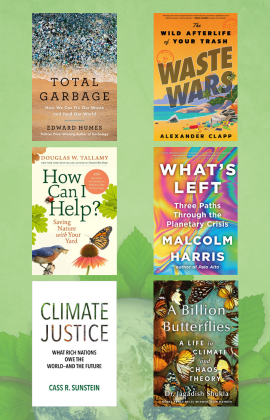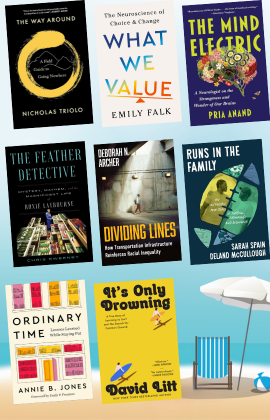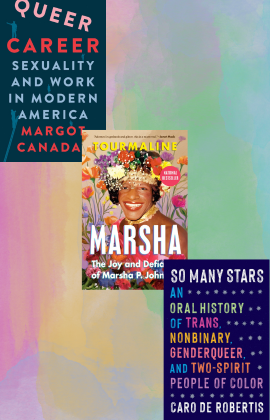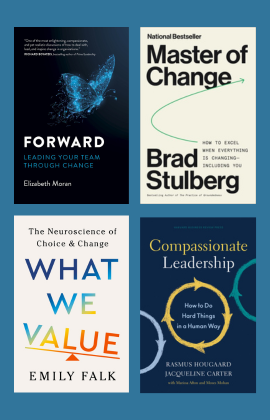
 Earth Day offers a powerful opportunity to reflect on our relationship with the planet, the environmental challenges we face, and the actions we can take to safeguard the Earth for future generations. I believe the most effective ways to deepen our understanding of these issues is through learning through discussions and reading. Books can offer knowledge, provoke thought, and inspire change. This Earth Day, I’m excited to highlight six thought-provoking books that tackle various facets of environmentalism, sustainability, and climate justice: Total Garbage by Edward Humes, Waste Wars by Alexander Clapp, How Can I Help? by Douglas Tallamy, What’s Left by Malcolm Harris, Climate Justice by Cass Sunstein, and A Billion Butterflies by Jagadish Shukla.
Earth Day offers a powerful opportunity to reflect on our relationship with the planet, the environmental challenges we face, and the actions we can take to safeguard the Earth for future generations. I believe the most effective ways to deepen our understanding of these issues is through learning through discussions and reading. Books can offer knowledge, provoke thought, and inspire change. This Earth Day, I’m excited to highlight six thought-provoking books that tackle various facets of environmentalism, sustainability, and climate justice: Total Garbage by Edward Humes, Waste Wars by Alexander Clapp, How Can I Help? by Douglas Tallamy, What’s Left by Malcolm Harris, Climate Justice by Cass Sunstein, and A Billion Butterflies by Jagadish Shukla.
Each of these books offers a unique perspective on environmental issues that are crucial to today’s global conversation. Let’s dive into each one and explore how they connect to the themes of Earth Day and environmental stewardship.
Total Garbage by Edward Humes: The Hidden World of Waste
Edward Humes’ Total Garbage: How We Can Fix Our Waste and Heal Our World is an eye-opening exploration of our society’s waste management systems and the mountains of trash we generate daily. The book delves into the hidden world of landfills, recycling programs, and the challenges of reducing waste. Humes not only paints a vivid picture of the sheer scale of waste production but also questions the sustainability of our current waste management strategies. He argues that while recycling is important, it’s not enough — true sustainability requires us to change the way we think about consumption and waste.
On Earth Day, Total Garbage reminds us of the urgency of reducing our environmental footprint. It compels readers to consider the impact of single-use plastics, disposable products, and our throwaway culture. Humes’ investigative reporting pushes us to rethink waste and motivates us to live more sustainably.
Waste Wars by Alexander Clapp: The Battle Over Garbage
In Waste Wars: The Wild Afterlife of Your Trash, Alexander Clapp takes readers on a journey through the evolving world of waste management in the United States. The book explores the complex politics of trash, from waste exportation to the rise of waste-to-energy technologies. Clapp provides an insightful look at the conflict between environmental advocates, waste management companies, and local governments. Through this lens, he explores how waste is commodified and the ways in which different stakeholders view trash as both a resource and a problem.
The book serves as a sobering reminder that Earth Day isn’t just about reducing waste on a personal level; it’s also about advocating for systemic change. Clapp’s work challenges us to confront the social and political dimensions of waste and how our collective action can influence policy and practices in the waste management industry.
How Can I Help? by Douglas Tallamy: The Case for Nature
Douglas Tallamy’s How Can I Help?: Saving Nature with Your Yard focuses on the importance of nurturing local ecosystems and taking action in our own backyards to combat the biodiversity crisis. Tallamy, an entomologist and ecologist, offers practical advice on how individuals can make a significant impact by planting native species, creating wildlife habitats, and supporting biodiversity. This book is a call to action for those who want to make a direct difference in the fight to protect nature.
On Earth Day, How Can I Help? reminds us that small, everyday actions — such as planting native plants, reducing pesticide use, and creating habitats for pollinators — can have a powerful ripple effect in preserving the natural world. By cultivating a deeper connection with our local environments, we help foster a sustainable future.
What’s Left by Malcolm Harris: The Crisis of Climate Change and the Political Left
What’s Left: Three Paths Through the Planetary Crisis by Malcolm Harris explores how the political left has evolved in its approach to climate change and environmental justice. Harris critiques the ways in which climate policy is often shaped by capitalism, inequality, and political inertia. He argues that addressing the climate crisis requires a more radical shift in policy, beyond individual efforts and minor reforms. Harris examines how economic systems, social justice, and environmental policy intersect, and challenges readers to think critically about the broader political landscape in which environmental solutions are proposed.
For Earth Day, Harris’ work provides an important perspective on the need for bold action, highlighting the role of politics and activism in creating a sustainable future. It serves as a call to action for individuals to engage with climate justice movements, advocate for systemic change, and challenge policies that perpetuate environmental harm.
Climate Justice by Cass Sunstein: Tackling Global Climate Challenges
In Climate Justice: What Rich Nations Owe the World—and the Future, legal scholar Cass Sunstein examines the ethical dimensions of climate change and its global implications. Sunstein looks at the complex moral and legal questions surrounding climate policy, including the responsibility of wealthier nations to assist poorer nations in addressing climate change. The book delves into the international negotiations and justice considerations involved in combating global warming.
Climate Justice is a valuable read for anyone interested in the intersection of law, policy, and environmentalism. It encourages us to think globally about the environmental challenges we face, urging readers to consider fairness and equity when implementing solutions for climate change. On Earth Day, this book reminds us that the fight for climate justice is not just a local or national issue, but a global one that requires cooperation and solidarity across borders.
A Billion Butterflies by Dr. Jagadish Shukla: Inspiring Change Through Nature’s Resilience
Dr. Jagadish Shukla’s A Billion Butterflies: A Life in Climate and Chaos Theory is a beautifully written and inspiring work that celebrates the resilience of nature and the power of collective action. Through the metaphor of butterflies migrating across vast distances, Shukla reminds readers of the interconnectedness of all living things and the profound impact that small actions can have on the environment. The book weaves together stories of environmental conservation, personal transformation, and the global efforts to protect endangered species and ecosystems.
This book offers a hopeful message for Earth Day — that through collective action, even the smallest steps can lead to profound change. The story of a billion butterflies reminds us that we are all part of a larger ecosystem, and our actions can contribute to the health and well-being of the planet.
A Call to Action for Earth Day
These six books offer diverse and compelling perspectives on environmental issues, each contributing to a broader understanding of the challenges we face and the steps we must take to protect our planet. Whether it’s confronting the realities of waste management (Total Garbage, Waste Wars), advocating for biodiversity (How Can I Help?), examining political and economic systems (What’s Left), addressing climate justice (Climate Justice), or drawing inspiration from nature’s resilience (A Billion Butterflies), each book provides a unique lens through which to view the world and the actions needed to preserve it.
On Earth Day, we can commit to learning more, taking action, and supporting the changes that will lead to a more sustainable and equitable world. These books are just the beginning of our journey toward a greener, more just planet. Use this Earth Day as an opportunity to deepen our knowledge, spark conversation, and inspire the actions that will make a difference.
Another book that I LOVED, that has been out for a couple of years, is Katharine Hayhoe’s Saving Us. Check out her weekly post: https://www.talkingclimate.ca/
Happy Earth Day! 🌍



